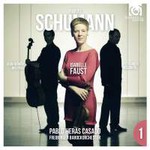
Violin Concerto in D minor / Piano Trio No. 3 in G minor, Op. 110
 $40.00
Low Stock
add to cart
$40.00
Low Stock
add to cart
SCHUMANN
Violin Concerto in D minor / Piano Trio No. 3 in G minor, Op. 110
Isabelle Faust (violin) / Freiburger Barockorchester, Pablo Heras-Casado, with Jean-Guihen Queyras (cello) & Alexander Melnikov (piano)
[ Harmonia Mundi CD + DVD / 2 CD/DVD ]
Release Date: Friday 10 April 2015
Should this item be out of stock at the time of your order, we would expect to be able to supply it to you within 2 - 5 business days.
In the autumn of 1851 Schumann composed, in rapid succession, the two violin sonatas and, in the space of just seven days from 2 to 9 October, the Piano Trio no.3, Op.110. As always during his work, Schumann was oblivious to everything around him, neglected social obligations, and isolated himself - even from Clara. 'Robert is working very assiduously on a trio for piano, violin, and cello,' she confided to her diary, 'but he won't let me hear anything of it until he has quite finished it - all I know is that it's in G minor.'
This trio, like all his other chamber works with piano, was tailor-made for Clara to play and right from the first rehearsal session in the domestic circle she went into a veritable frenzy of delight: 'It is original, absolutely full of passion, especially the scherzo, which sweeps one away to the wildest depths', Just a little bit of that same enthusiasm would probably have spared the Violin Concerto a great deal of opprobrium: Clara witheld the score, as did the dedicatee, Joachim. It was finally premiered in Berlin on 26 November 1937, more than 80 years after it was composed, with the Berlin Philharmonic conducted by Karl Böhm and the violinist Georg Kulenkampff. Yehudi Menuhin had the privilege of making the first commercial recording, produced in the following year, 1938, with the New York Philharmonic under its British principal conductor John Barbirolli.
This first volume in a trilogy comprising the complete concertos and piano trios of Schumann brings together two late and unjustly neglected works. The instigators of the project, Isabelle Faust, Alexandre Melnikov and Jean-Guihen Queyras, champion their cause with a force of conviction and a choice of instruments that restore the delicate transparency and subtlety of their textures. The next release will be of the Piano Concerto and Piano Trio No. 2.
"The idea for this CD project arose during a tour on which we performed Robert Schumann's Trio Op.80. As passionate admirers of the composer, we conceived the desire to place his works for piano, violin and cello in a broader context and to illuminate them mutually in order to allow listeners to gain a deeper understanding of his music. We soon agreed to play the pieces for this recording on a historical piano and stringed instruments with gut strings, using orchestral forces to match. Pablo Heras-Casado and the Freiburger Barockorchester sprang spontaneously to mind as the ideal partners for a project of this kind. Our shared journey into the magical world of this incomparable composer will remain with us as an exceptionally intense, happy, and fulfilling experience." Isabelle Faust, Alexander Melnikov, Jean-Guihen Queyras.
"Faust's focused tone, stripped of vibrato, combines with the richness of the Freiburg Baroque Orchestra to demonstrate that this work is no strained product of a frail mind but rather a characteristic experiment...[the Third Piano Trio] has been recorded on period instruments...but Faust, Queyras and Melnikov offer a technically sharper, more imaginatively phrased reading." (Gramophone March 2015)
"The concerto fires up with such vigour that it feels like Brahms, not Schumann. This is, unusually, a performance on gut strings of Schumann's late, neglected Violin Concerto and that gives it all the energy and élan that one would expect … The Piano Trio No 3, for which Faust is joined by Jean-Guihen Queyras and Alexander Melnikov, is light, expressive, imaginative." (Financial Times)
'In this performance, Isabelle Faust brings tremendous insight and an infinite variety of colour to the hugely demanding solo part. The great advantage of presenting Schumann on period instruments is brilliantly demonstrated here.' (BBC Music Concerto Recording of the Month June 2015)
"Faust and her colleagues have the knack of teasing out [the Piano Trio's] lyrical beauties and giving all the music real lightness and transparency." (Guardian)
"the rigour [the ensemble] brings to the big tuttis in the first movement make them sound more like interpolations in some 18th-century drama rather than a 19th-century concerto, although the orchestra does also show that it can bend with the music...There is much more to enjoy once the problems raised by the concerto are out of the way...The balance of sonority here is ideal, the music's emotional perspective finely judged." (Daily Telegraph)
Tracks:
Piano Trio No. 3 in G minor, Op. 110
Violin Concerto in D minor, WoO 23